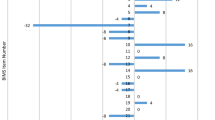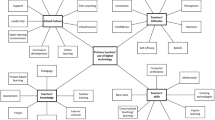Abstract
This study examines teacher perceptions regarding professional development practices used in a region of the NSW Department of School Education to support the implementation of the K-6 Science and Technology Syllabus. The findings from a survey of 97 teachers indicate that teachers have a preference for ‘traditional’ models of in-service which may not bring about significant changes. Teachers also perceive that change is brought about through the influence of external factors such as in-service and resources which are not directly the responsibillity of individual teachers. This contrasts with the perception that the inability to change is due to internal personal qualities.
Similar content being viewed by others
References
Bechtelheimer, L., & Tamashiro, R. (1987) Explaining teachers' thinking in computer curriculum courses. Paper presented at the Midwest Education and Technology Conference, St Louis, MO.
Board of Studies (1991).Science and Technology K-6. North Sydney NSW.
Braithwaite, J., & Koop, T. (1985). What help do teachers really need?. A case study of curriculum and professional support system.Curriculum Perspectives, 5(2), 59–61.
Carrick, J. (Sir) (1989).Report of the Committee of Review of New South Wales schools. New South Wales Government.
Goodrum, D., Cousins, J. & Kinnear, P.J. (1992). The reluctant primary school teacher.Research in Science Education, 22, 163–169.
Howser, M. A. (1989).Why some middle aged teachers fail to learn and grow. Oregon School Study Council, University of Oregon.
Ingvarson, L. (1987). Models of in-service education and their implications for professional development policy.ITA 17(2), 14–19.
Joyce, B., & Showers, B. (1980). Improving in-service training: The message of the research.Educational Leadership, 37(2), 379–385.
NSWDoE [New South Wales Department of Education] (1989).Investigating: Science K-6. An evaluation of the implementation of the 1980 curriculum policy statement in NSW schools. Internal Departmental Report.
NSWDSE [New South Wales Department of School Education] (1990).Program evaluation of staff development in NSW government schools. Internal Department Report.
Renner, J. (1990). Planned educational change: Statewide implementation of a New curriculum in Western Australia.Curriculum Perspectives, 10(2), 37–45.
Rennie, L.J., Parker, L.H., Hutchinson, P.E. (1988).The effect of inservice training on teacher attitudes and primary school science classroom environments. Measurement and Statistics Laboratory, Research report number 12. Perth WA: Department of Education, University of Western Australia.
Sharon, D. (1987).The Renfrew Quality Education Project: Teachers' views after the first year, Working Papers of the Planning and Development Research Branch, TV Ontario. No, 87-2.
Skamp, K. (1991). Primary Science and Technology. How confident are teachers?Research in Science Education, 21, 290–299.
Author information
Authors and Affiliations
Additional information
Specializations; K-6 teacher education in science and technology education, children's learning in science and technology.
Rights and permissions
About this article
Cite this article
Webb, C. Teacher perceptions of professional development needs and the implementation of the K-6 science and technology syllabus. Research in Science Education 23, 327–336 (1993). https://doi.org/10.1007/BF02357077
Issue Date:
DOI: https://doi.org/10.1007/BF02357077




